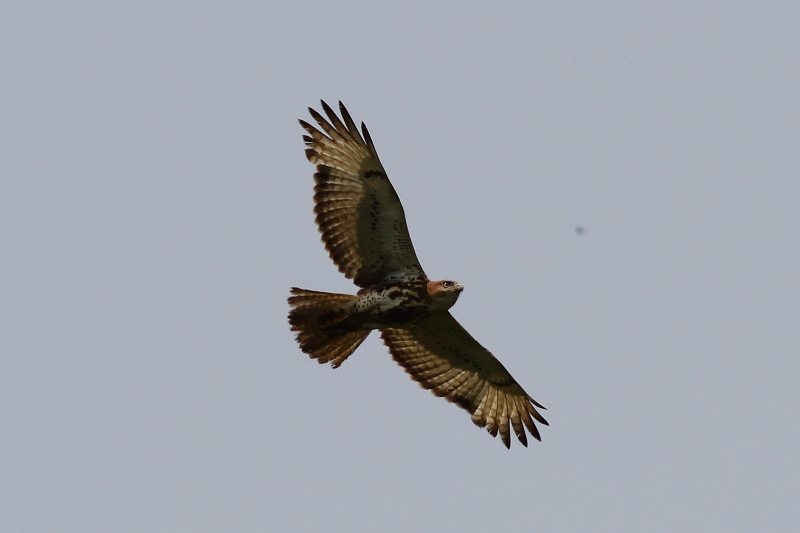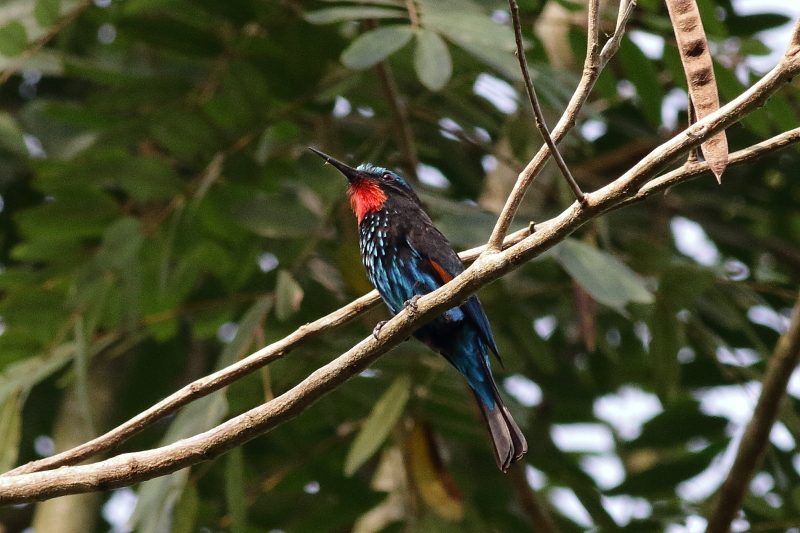Quite a long day today. We were up an hour before sunrise to try for nightjars a short distance away from our hotel. We had around half a dozen Long-tailed Nightjars which all gave good views but none of the hoped for Black-shouldered or Plain Nightjars. The original plan was to spend the day on the rope bridge in Kakum National Park but as it was a public holiday the place was likely to be swamped by "civilians", it was decided to postponed our trip there until the following day when the masses would have dissipated. There were plenty of other good spots to be visited any way. We travelled a good hour and a half north of the park to an area of farmland with some remnants of secondary forest. The first stop didn't look all that special with just a small stream which formed the border between farmland and forestry. I was surprised to be told that our target here was White-spotted Flufftail. After a bit of a wait a male eventually showed to all present. While we were waiting a Dwarf Bittern briefly flew into some of the adjacent trees but quickly flew straight off again once it spotted us. Two good birds in quick succession! We saw an excellent selection of species over the next few hours including a stunning Black Bee-eater.
We then checked the River Pra where we had our only White-bibbed Swallows and Rock Pratincoles of the trip. Someone had a brief but distant African Finfoot which typically for the species promptly disappeared into thin air. I was a bit shocked to see the state of the river however. The levels of siltation were astoundingly bad. This was a result of illegal gold mining which occurs on the rivers from floating platforms. Illegal gold mining is a huge problem in the country despite recent crackdowns. Most of the money, organisation sand even some of the labour associated with a lot these operations come from China. Over a thousand Chinese workers have been deported from the country in recent years but it's difficult to see if it has made any significant difference with this huge problem. The drinking water has been polluted by chemicals used in the gold mining industry such as mercury, cyanide, lead, etc. There are also problems with child labour in these mines. During its time as a British colony the country was called The Gold Coast. It has the second highest amounts of gold deposits in Africa. Worth checking out the two short pieces on the issue below.
https://www.youtube.com/watch?v=ohrrE1rjzLo
https://www.youtube.com/watch?v=ye3Bs7D_i98
Just before sunset we dropped into Kakum NP for Fraser's and Akun Eagle Owl. We managed to get excellent views of the latter. What was very disappointing though was the huge amount of litter dropped everywhere by the masses of tourists who had obviously been present during the day. A lot of the litter consisted of plastic bags which are used as water bags and are much common than bottles of water in Ghana. People just seemed to drop them where they stood even though there were a few rubbish bins in the vicinity. They appeared to be no effort from the park staff to start a clean up either. As an introduction to a "national park" it left a very poor impression on me. Unfortunately this was to be a common sight during the trip. Areas such as road checkpoints and toll stations had huge amount of rubbish in their immediate vicinity. They're seemed to be zero respect for peoples own villages, towns or cities by the local people themselves.
After evening dinner back in the hotel, three of us headed back out to a nearby forest where a moth trap had been put out for one of our tour members. As the trap wasn't working we had a quick walk around to look for more owls. We came across a Fraser's Eagle Owl calling from within a large area of forestry. We decided to head into the area to try and see it. The owl progressively moved further and further into the forestry with us following all the time. After a time it was obvious we weren't going to see it so we began to make our way back out of the forestry. It didn't take long for us to realise that we had completely lost our way. Secondary rainforest is difficult terrain to walk off pathway during daylight hours so it certainly was no picnic in darkness! There came a point where we thought we might have to spend the night in the forest but thankfully we managed to stumble across a trackway. To say we were relieved was a bit of an understatement!
We then checked the River Pra where we had our only White-bibbed Swallows and Rock Pratincoles of the trip. Someone had a brief but distant African Finfoot which typically for the species promptly disappeared into thin air. I was a bit shocked to see the state of the river however. The levels of siltation were astoundingly bad. This was a result of illegal gold mining which occurs on the rivers from floating platforms. Illegal gold mining is a huge problem in the country despite recent crackdowns. Most of the money, organisation sand even some of the labour associated with a lot these operations come from China. Over a thousand Chinese workers have been deported from the country in recent years but it's difficult to see if it has made any significant difference with this huge problem. The drinking water has been polluted by chemicals used in the gold mining industry such as mercury, cyanide, lead, etc. There are also problems with child labour in these mines. During its time as a British colony the country was called The Gold Coast. It has the second highest amounts of gold deposits in Africa. Worth checking out the two short pieces on the issue below.
https://www.youtube.com/watch?v=ohrrE1rjzLo
https://www.youtube.com/watch?v=ye3Bs7D_i98
Just before sunset we dropped into Kakum NP for Fraser's and Akun Eagle Owl. We managed to get excellent views of the latter. What was very disappointing though was the huge amount of litter dropped everywhere by the masses of tourists who had obviously been present during the day. A lot of the litter consisted of plastic bags which are used as water bags and are much common than bottles of water in Ghana. People just seemed to drop them where they stood even though there were a few rubbish bins in the vicinity. They appeared to be no effort from the park staff to start a clean up either. As an introduction to a "national park" it left a very poor impression on me. Unfortunately this was to be a common sight during the trip. Areas such as road checkpoints and toll stations had huge amount of rubbish in their immediate vicinity. They're seemed to be zero respect for peoples own villages, towns or cities by the local people themselves.
After evening dinner back in the hotel, three of us headed back out to a nearby forest where a moth trap had been put out for one of our tour members. As the trap wasn't working we had a quick walk around to look for more owls. We came across a Fraser's Eagle Owl calling from within a large area of forestry. We decided to head into the area to try and see it. The owl progressively moved further and further into the forestry with us following all the time. After a time it was obvious we weren't going to see it so we began to make our way back out of the forestry. It didn't take long for us to realise that we had completely lost our way. Secondary rainforest is difficult terrain to walk off pathway during daylight hours so it certainly was no picnic in darkness! There came a point where we thought we might have to spend the night in the forest but thankfully we managed to stumble across a trackway. To say we were relieved was a bit of an understatement!
 |
| Lesser Striped Swallow |
 |
| Dusky-blue Flycatcher |
 |
| Red-vented Malimbe |
 |
| Yellow-browed Camaroptera |
 |
| African Pygmy Kingfisher |
 |
| Red-necked Buzzard |
 |
| Mottled Spinetail |
 |
| African Pied Wagtail |
 |
| African Pied Wagtail |
 |
| Black Bee-eater |
 |
| Black Bee-eater |
 |
| Rock Pratincole |
 |
| Rock Pratincole |
 |
| Long-tailed Nightjar |
 |
| Long-tailed Nightjar |
 |
| Akun Eagle Owl |
 |
| Doing his little bit for deforestation :-( |
 |
| Pra River. Like most Ghanian rivers it is severely damaged thanks to illegal gold mining taking place in the river itself. |
 |
| African Giant Land Snail |













